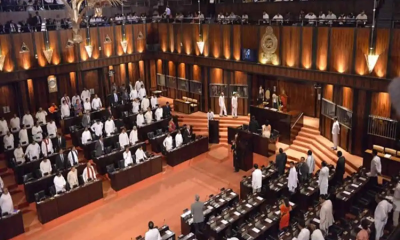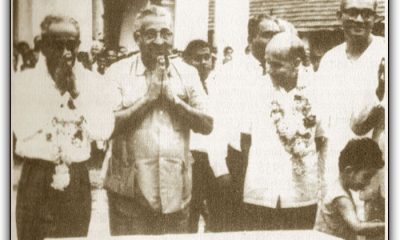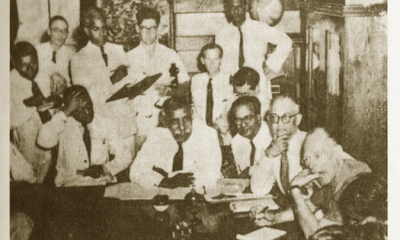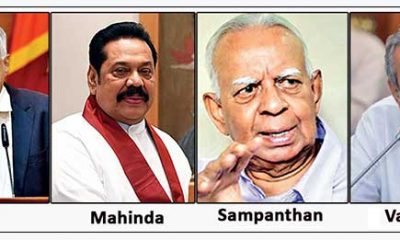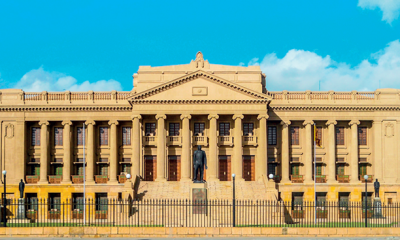Features
Independence, the first cabinet and Prime Minister DS Senanayake
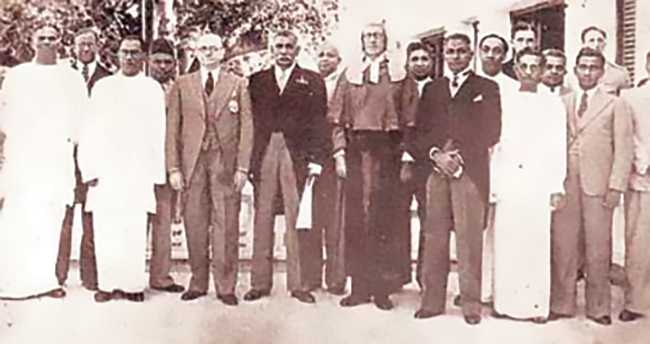
PM held a tight leash and once threatened to resign if the ministers didn’t change their minds
(Excerpted from the Memoirs of a Cabinet Secretary by BP Peiris)
Cabinet Government was established with the promulgation of the new constitution. Sir Henry Monck-Mason Moore, Governor, who had been appointed Governor-General, called on D.S. Senanayake to form a Government. He formed a cabinet of 14 consisting of S.W.R.D. Bandaranaike, Sir Oliver Goonetilleke, George E. De Silva, J. L. Kotelawala, J. R. Jayewardene, L. A. Rajapakse, R. S. S. Gunawardena, Dudley Senanayake, C. Suntharalingam, T. B. Jayah, E. A Nugawela, A. Ratnayake and C. Sittampalam.
The first meeting was held on October 8, 1947, in the Cabinet Room, said to be one of the most beautiful in the whole of the Commonwealth. The only door leading to the room was closely barred. Police officers kept guard at the entrances leading to the Prime Minister’s Office and the Senate to prevent unauthorized persons from entering the building.
At this meeting, the Ministers, the Secretary and the Assistant took an oath of secrecy, which was an adaptation of the Privy Councillor’s oath but which had no statutory force. This was considered necessary by D.S. as the decisions of the Board of Ministers in the days of the State Council reached in the morning, regularly appeared in the late editions of the evening newspapers the same day.
In the absence of the Secretary, I had no power to administer the oath and, on two occasions, Ministers had to suffer the indignity of having to be taken round by me before a Justice of the Peace. D.S. therefore had me appointed a Justice of the Peace for the Judicial District of Colombo ex officio while holding the post of Assistant Secretary.
The oath of secrecy, however, did not prevent the leakage of Cabinet news to the Press. The same thing probably happens in other countries. Ministers like to be on the good side of the Press and oblige pressmen with news now and then. Eric Linklater, in his novel ‘The Impregnable Women’ puts these words into the mouth of Lord Pippin, the Prime Minister:
“The Cabinet puts an unbreakable seal upon the mouths of its members, and no one, for any purpose whatsoever, may take private advantage of what he learns in the sanctitude of our joint deliberations. This rule is inviolable, and like all rules, it is violated quite frequently.”
Except on one occasion when he had to see his doctor, D.S. was never late for a meeting and he insisted on other Ministers being punctual. All the Ministers complied with this request except S.W.R.D. who was invariably more than one hour late and who, on arrival, would greet the Prime Minister with a “Good morning, D.S.,” when every other Minister addressed him as “Sir” and inquire what business the Cabinet had transacted in his absence. The ground had then to be gone over again for his benefit and D.S. resented the waste of time but seemed unable to remedy it.
In the Chair, D.S. was firm and would not allow a Minister to raise a matter which was not on the Agenda unless the circumstances were exceptional. When a Minister attempted to raise a matter orally, he would say he knew nothing about it and ask a Cabinet Paper be submitted.
After the first meeting, the Prime Minister entertained the Ministers and the Secretaries to lunch in the Senate. It is strange that his first meeting and his last should have ended with a Cabinet lunch in the Senate.
D.S. was not a scholar; he had not been to a university and had no academic degree. He was an agriculturist and a gentleman-farmer and loved the land. He told me that he had planted his coconut land, probably at Botale, with his own hands and was very proud of it. But he had also been brought up early in the school of politics and was a master of political strategy which was the result of experience. There was no hypocrisy about him. In fact, it might be said that his want of hypocrisy was his greatest liability.
He was able, with that experience of his, to seize the core of the matter under discussion and throw away the non-essential covering. Often, when a Minister was arguing a Cabinet paper and taking more time than he thought was necessary, he would say “But actually, as a matter of fact, isn’t this the point?” The matter would then be settled in a few minutes. In this way, he used, very often, to clear the entire agenda. Of D.S. it can be said, “I come not, friends, to steal your hearts away: I am no orator, as Brutus is, but as you know me all, a plain blunt man…”
There was an occasion where the Cabinet decided that the price of a certain article should be increased by two cents. The Minister concerned was reluctant to carry this decision into effect but was bound by the rule of collective responsibility. He went back to his office and increased the price by one and a half cents. D.S. was angry when I brought the matter to his notice. The Minister was angry with me for having brought the matter to the Prime Minister’s notice. The Minister was ordered to carry out the Cabinet decision. I was directed to inform all Ministers that, if they were unable to carry out a Cabinet decision, they should bring the matter again before the Cabinet instead of acting on their own.
It was clear that we were not experienced in the theory and technique of Government by collective responsibility. One Minister told the Cabinet, after a decision had been reached, that he had to put it to his constituents! D.S. was working hard at this time to establish certain traditions and conventions. Heads of Departments were asking for copies of Cabinet papers to which they were not entitled. The Legal Draftsman was being asked to draft Bills by individual Ministers before the policy involved in the Bill had been approved collectively.
D.S. consulted me and laid down a few rules for the guidance of Ministers. The Legal Draftsman was not to undertake the drafting of a Bill’ until he had been informed by the Cabinet Secretariat that the proposal had the approval of the Cabinet. No paper was to be placed on the Agenda unless it had been in the hands of Ministers for three clear days before the meeting. These might be considered to be matters of detail; but D.S. was convinced that it was only by setting the details and straightening things out that the Ministers could be made to function as a collective body. In this, I think he succeeded to a large extent. There were occasional lapses.
D.S. was keen on granting trade union rights to public servants and introducing Whitley Councils. He was of the view that public servants of all classes should be given the right to form associations without any official interference, supervision or control. An exception was made in the case of the Police Force, the Prisons staff and the Agricultural Corps. He also insisted that the office bearers of a trade union of public servants should be public servants who are members of that union, and that a union should not have the right to have a political object or to make political levy. He refused to give trade unions the right of affiliation. Most of our troubles today seem to arise from the fact that trade unions are headed and controlled by political leaders who are not public servants and are not in the ‘trade’.
Before the Government took over, there had been a strike among certain sections of public servants who had been interdicted and against whom charges had been framed. D.S. agreed to make a statement in Parliament that this matter, at no time, came within the purview of his Government, that any proceedings that were being taken were merely a continuation of disciplinary action originated prior to his assumption of office and that it would not be proper for his Government to interfere with the continuance of the proceedings by the duly constituted authorities.
D.S.’s first rub was with the Public Service Commission. The Government had imported from abroad an officer called Paget as it was assumed that he had no connection with Ceylon and could be trusted to act absolutely independently and impartially. Paget assumed office as Chairman of the Commission. It was then found that he was a brother-in-law of Lanktree, a member of the Civil Service.
Paget construed the Constitution very strictly. He would have no interference by the Ministers in regard to appointments. On the other hand, Ministers found that they were unable to work with some of the Heads of Departments foisted on them by Paget. D.S., with his horse sense sent for Paget and, with some plain speaking, arrived at a workable compromise.
After the promulgation of the new Constitution, D.S. was in constant communication with the United Kingdom regarding the grant of full Dominion Status to Ceylon. This meant the removal of the reserved powers vested in the Governor under the earlier Order in Council. He informed the Ministers that the Imperial Government was willing to accede to Ceylon’s request but that, before this could be done, it would be necessary to pass a Bill in the Imperial Parliament conferring fully responsible status on Ceylon within the British Commonwealth.
It was possible that this Bill would become law before the next session of the Ceylon Parliament. Before the Bill was introduced in the Imperial Parliament, it was necessary that Ceylon should sign certain agreements with the United Kingdom. These were accordingly signed. In the External Affairs Agreement, Ceylon agreed to adopt and follow the resolutions of past Imperial Conferences. Was it intended by this, Ministers asked, to impose on this Government, a higher obligation in respect of such resolutions than existed in the case of any one of the other Dominions?
The Prime Minister stated that was clearly not the intention. The Agreements were to continue in force only as long as the two Governments considered them to be of mutual benefit, and it was implied that the Government could denounce the Agreements, in whole or in part, if the need arose. The Prime Minister was authorized to sign the Agreements on behalf of the Government.
Five documents were necessary to confer Dominion status on Ceylon:
1. A Ceylon Independence Act passed by the Parliament of the United Kingdom to confer on the Ceylon Parliament full legislative powers, and to deprive the United Kingdom of responsibility for the Government of Ceylon.
2. An Order in Council to remove the limitations on self-government in the Ceylon Constitution,
3. An External Affairs Agreement to provide for certain matters relating to external affairs.
4. A Defence Agreement of such a nature that the necessary measures could be taken for the defence of Ceylon.
5. A Public Officers’ Agreement transferring to the Ceylon Government the responsibilities hitherto vested in the Government of the United Kingdom in relation to public officers.
The three Agreements were signed in Colombo on November 11, 1947, by the Governor-General, on behalf of the Government of the United Kingdom, and by the Prime Minister of behalf of the Government of Ceylon. The Ceylon Independence Act, passed by the United Kingdom Parliament, received the Royal Assent on December 10,1947. On December 19,1947 His Majesty approved the Ceylon Independence (Commencement) Order in Council and the Ceylon Independence Order in Council.
D.S. was a very happy man; his labours had succeeded, but they had to wait for official information that the documents had received Royal Approval. D.S. was waiting at Queen’s House for the news which was late. When it finally came on the ticker, he was so elated, he broke all his rules and opened a few bottles of champagne at his house “Woodlands.” The Cabinet approved the following resolution to be moved in Parliament : This House rejoices that after many years of subjection to foreign rule, the struggle of the people of Ceylon for freedom has culminated in the attainment of independence.
The first Parliament of Independent Ceylon was opened on February 10, 1948, by His Royal Highness the Duke of Gloucester. The Speech from the Throne was drafted by T. D. Perera. The Duke began:
“By a Royal Commission issued by His Majesty the King, I have been commanded to visit this Island, and on behalf of His Majesty, to declare the causes of opening a new session of the Parliament of Ceylon, the first session under her new status of Independence. It is a matter of considerable gratification to me that I have been chosen to convey to you His Majesty’s Most Gracious Speech from the Throne to both Houses of Parliament of Ceylon which is as following.” (I need not here reproduce the entire speech from the Throne to both Houses of Parliament of Ceylon which is set out in other official documents.)
The first paragraph read: “I regret that it has not been possible for me to address you in person on this occasion which marks an event of the greatest importance in the history of this country. After a period of nearly a century and a half, during which the status of Ceylon was that of a Colony in My Empire, she now takes her place as a free and independent member of the British Commonwealth of Nations.”
The Duke, though dressed in white uniform, was obviously in distress owing to the tropical heat. His uniform did not have any pockets and his handkerchief, neatly folded, wis carried by the Duchess. On the dais were Their Royal Highnesses and D. S. and Mrs Senanayake. Several times during the Speech, the Duke had to turn round to his wife for the loan of his handkerchief to mop his brow.
By the end of 1948, three Ministers had been replaced. Sir Oliver Goonetilleke had been appointed as our High Commissioner in London and was succeeded by E. A. P. Wijeratne. George E. de Silva’s portfolio had been taken over by C. Sittampalam and A. E. Goonesinha had joined the Cabinet as Minister without Portfolio. G. G. Ponnambalam later took on the Ministry of Industries. H. W. Amarasuriya had become Minister of Commerce and Trade in place of C. Suntharalingam.
Suntharalingam had been consistently opposing, in Cabinet certain proposals relating to persons of Indian descent resident in Ceylon, a problem now known as the Indo-Ceylon problem. He was the sole dissentient, and, on the final decision, asked that his dissent be recorded in the minutes. In drafting the minutes I made no reference to the dissent. When the minutes came up for confirmation at the next meeting, he pointed out the omission and asked that the error be rectified.
I anticipated that he would raise this point, and was armed with the necessary books. I quoted authority to show that a dissent was not recorded in Cabinet minutes in view of the doctrine of collective responsibility.
That once a decision had been reached, a Minister’s duty was to support it, both in Parliament as well as on the public platforms, and that if he found himself unable to do so, his clear duty was to resign. Suntharalingam inquired what I was reading from and when he was told that it was “Jennings on Cabinet Government”, said that the authority was completely outdated. D.S. preferred to follow Jennings and the dissent was not recorded.
Shortly afterwards, this matter came up in the House of Representatives. I had taken no interest in the proceedings of the House. One evening, my telephone rang and when I inquired who was speaking, there was no answer.
All that the voice said was “I want you to look up your books and draft a strong letter dismissing my Minister. See me at Temple Trees tomorrow morning at eight.” I did not know what had happened or who the Minister was. I had to get this information from the Clerk to the House.
He said that when this question came for voting, Suntharalingam left the Chamber. The Prime Minister had thought that he had gone to the lavatory but was informed that during the time that the division was being taken, Suntharalingam was in the lobby. With the strongly worded draft and a stenographer, I saw the Prime Minister the next day at the appointed time. He was in his bath and apologized for his delay of ten minutes..
He was never known to have kept a public servant waiting. He read the letter very carefully and said that the wording was far too strong. He then signed an amended draft. “Sun”, as everybody called him, left the Cabinet shortly afterwards. He was amazing at any problem involving mathematics. On the China Rice-Rubber contract, for example, he would, like his colleague, Sittampalam, work out, without paper or pencil, the total cost of so many thousand tons at pounds sterling 71/2d per ton. He was a very intellectual man, and his departure from the Cabinet was a great loss.
The Cabinet was once discussing one of D.S.’s own Cabinet Papers and, during the discussion, it was found that nearly every Minister was opposed to his proposal. He was very annoyed. It was the first and the only time that a vote has been taken in Cabinet, and the voting in a Cabinet of fourteen was thirteen against, with the Prime Minister for. He pushed his heavy satinwood chair back, rose, and said that he would adjourn the meeting for the next day for further consideration; if the Ministers remained of the same view, he would hand in his resignation. On the next day, the thirteen Ministers were in complete agreement with the Prime Minister!
Features
The heart-friendly health minister

by Dr Gotabhya Ranasinghe
Senior Consultant Cardiologist
National Hospital Sri Lanka
When we sought a meeting with Hon Dr. Ramesh Pathirana, Minister of Health, he graciously cleared his busy schedule to accommodate us. Renowned for his attentive listening and deep understanding, Minister Pathirana is dedicated to advancing the health sector. His openness and transparency exemplify the qualities of an exemplary politician and minister.
Dr. Palitha Mahipala, the current Health Secretary, demonstrates both commendable enthusiasm and unwavering support. This combination of attributes makes him a highly compatible colleague for the esteemed Minister of Health.
Our discussion centered on a project that has been in the works for the past 30 years, one that no other minister had managed to advance.
Minister Pathirana, however, recognized the project’s significance and its potential to revolutionize care for heart patients.
The project involves the construction of a state-of-the-art facility at the premises of the National Hospital Colombo. The project’s location within the premises of the National Hospital underscores its importance and relevance to the healthcare infrastructure of the nation.
This facility will include a cardiology building and a tertiary care center, equipped with the latest technology to handle and treat all types of heart-related conditions and surgeries.
Securing funding was a major milestone for this initiative. Minister Pathirana successfully obtained approval for a $40 billion loan from the Asian Development Bank. With the funding in place, the foundation stone is scheduled to be laid in September this year, and construction will begin in January 2025.
This project guarantees a consistent and uninterrupted supply of stents and related medications for heart patients. As a result, patients will have timely access to essential medical supplies during their treatment and recovery. By securing these critical resources, the project aims to enhance patient outcomes, minimize treatment delays, and maintain the highest standards of cardiac care.
Upon its fruition, this monumental building will serve as a beacon of hope and healing, symbolizing the unwavering dedication to improving patient outcomes and fostering a healthier society.We anticipate a future marked by significant progress and positive outcomes in Sri Lanka’s cardiovascular treatment landscape within the foreseeable timeframe.
Features
A LOVING TRIBUTE TO JESUIT FR. ALOYSIUS PIERIS ON HIS 90th BIRTHDAY

by Fr. Emmanuel Fernando, OMI
Jesuit Fr. Aloysius Pieris (affectionately called Fr. Aloy) celebrated his 90th birthday on April 9, 2024 and I, as the editor of our Oblate Journal, THE MISSIONARY OBLATE had gone to press by that time. Immediately I decided to publish an article, appreciating the untiring selfless services he continues to offer for inter-Faith dialogue, the renewal of the Catholic Church, his concern for the poor and the suffering Sri Lankan masses and to me, the present writer.
It was in 1988, when I was appointed Director of the Oblate Scholastics at Ampitiya by the then Oblate Provincial Fr. Anselm Silva, that I came to know Fr. Aloy more closely. Knowing well his expertise in matters spiritual, theological, Indological and pastoral, and with the collaborative spirit of my companion-formators, our Oblate Scholastics were sent to Tulana, the Research and Encounter Centre, Kelaniya, of which he is the Founder-Director, for ‘exposure-programmes’ on matters spiritual, biblical, theological and pastoral. Some of these dimensions according to my view and that of my companion-formators, were not available at the National Seminary, Ampitiya.
Ever since that time, our Oblate formators/ accompaniers at the Oblate Scholasticate, Ampitiya , have continued to send our Oblate Scholastics to Tulana Centre for deepening their insights and convictions regarding matters needed to serve the people in today’s context. Fr. Aloy also had tried very enthusiastically with the Oblate team headed by Frs. Oswald Firth and Clement Waidyasekara to begin a Theologate, directed by the Religious Congregations in Sri Lanka, for the contextual formation/ accompaniment of their members. It should very well be a desired goal of the Leaders / Provincials of the Religious Congregations.
Besides being a formator/accompanier at the Oblate Scholasticate, I was entrusted also with the task of editing and publishing our Oblate journal, ‘The Missionary Oblate’. To maintain the quality of the journal I continue to depend on Fr. Aloy for his thought-provoking and stimulating articles on Biblical Spirituality, Biblical Theology and Ecclesiology. I am very grateful to him for his generous assistance. Of late, his writings on renewal of the Church, initiated by Pope St. John XX111 and continued by Pope Francis through the Synodal path, published in our Oblate journal, enable our readers to focus their attention also on the needed renewal in the Catholic Church in Sri Lanka. Fr. Aloy appreciated very much the Synodal path adopted by the Jesuit Pope Francis for the renewal of the Church, rooted very much on prayerful discernment. In my Religious and presbyteral life, Fr.Aloy continues to be my spiritual animator / guide and ongoing formator / acccompanier.
Fr. Aloysius Pieris, BA Hons (Lond), LPh (SHC, India), STL (PFT, Naples), PhD (SLU/VC), ThD (Tilburg), D.Ltt (KU), has been one of the eminent Asian theologians well recognized internationally and one who has lectured and held visiting chairs in many universities both in the West and in the East. Many members of Religious Congregations from Asian countries have benefited from his lectures and guidance in the East Asian Pastoral Institute (EAPI) in Manila, Philippines. He had been a Theologian consulted by the Federation of Asian Bishops’ Conferences for many years. During his professorship at the Gregorian University in Rome, he was called to be a member of a special group of advisers on other religions consulted by Pope Paul VI.
Fr. Aloy is the author of more than 30 books and well over 500 Research Papers. Some of his books and articles have been translated and published in several countries. Among those books, one can find the following: 1) The Genesis of an Asian Theology of Liberation (An Autobiographical Excursus on the Art of Theologising in Asia, 2) An Asian Theology of Liberation, 3) Providential Timeliness of Vatican 11 (a long-overdue halt to a scandalous millennium, 4) Give Vatican 11 a chance, 5) Leadership in the Church, 6) Relishing our faith in working for justice (Themes for study and discussion), 7) A Message meant mainly, not exclusively for Jesuits (Background information necessary for helping Francis renew the Church), 8) Lent in Lanka (Reflections and Resolutions, 9) Love meets wisdom (A Christian Experience of Buddhism, 10) Fire and Water 11) God’s Reign for God’s poor, 12) Our Unhiddden Agenda (How we Jesuits work, pray and form our men). He is also the Editor of two journals, Vagdevi, Journal of Religious Reflection and Dialogue, New Series.
Fr. Aloy has a BA in Pali and Sanskrit from the University of London and a Ph.D in Buddhist Philosophy from the University of Sri Lankan, Vidyodaya Campus. On Nov. 23, 2019, he was awarded the prestigious honorary Doctorate of Literature (D.Litt) by the Chancellor of the University of Kelaniya, the Most Venerable Welamitiyawe Dharmakirthi Sri Kusala Dhamma Thera.
Fr. Aloy continues to be a promoter of Gospel values and virtues. Justice as a constitutive dimension of love and social concern for the downtrodden masses are very much noted in his life and work. He had very much appreciated the commitment of the late Fr. Joseph (Joe) Fernando, the National Director of the Social and Economic Centre (SEDEC) for the poor.
In Sri Lanka, a few religious Congregations – the Good Shepherd Sisters, the Christian Brothers, the Marist Brothers and the Oblates – have invited him to animate their members especially during their Provincial Congresses, Chapters and International Conferences. The mainline Christian Churches also have sought his advice and followed his seminars. I, for one, regret very much, that the Sri Lankan authorities of the Catholic Church –today’s Hierarchy—- have not sought Fr.
Aloy’s expertise for the renewal of the Catholic Church in Sri Lanka and thus have not benefited from the immense store of wisdom and insight that he can offer to our local Church while the Sri Lankan bishops who governed the Catholic church in the immediate aftermath of the Second Vatican Council (Edmund Fernando OMI, Anthony de Saram, Leo Nanayakkara OSB, Frank Marcus Fernando, Paul Perera,) visited him and consulted him on many matters. Among the Tamil Bishops, Bishop Rayappu Joseph was keeping close contact with him and Bishop J. Deogupillai hosted him and his team visiting him after the horrible Black July massacre of Tamils.
Features
A fairy tale, success or debacle

Sri Lanka-Singapore Free Trade Agreement
By Gomi Senadhira
senadhiragomi@gmail.com
“You might tell fairy tales, but the progress of a country cannot be achieved through such narratives. A country cannot be developed by making false promises. The country moved backward because of the electoral promises made by political parties throughout time. We have witnessed that the ultimate result of this is the country becoming bankrupt. Unfortunately, many segments of the population have not come to realize this yet.” – President Ranil Wickremesinghe, 2024 Budget speech
Any Sri Lankan would agree with the above words of President Wickremesinghe on the false promises our politicians and officials make and the fairy tales they narrate which bankrupted this country. So, to understand this, let’s look at one such fairy tale with lots of false promises; Ranil Wickremesinghe’s greatest achievement in the area of international trade and investment promotion during the Yahapalana period, Sri Lanka-Singapore Free Trade Agreement (SLSFTA).
It is appropriate and timely to do it now as Finance Minister Wickremesinghe has just presented to parliament a bill on the National Policy on Economic Transformation which includes the establishment of an Office for International Trade and the Sri Lanka Institute of Economics and International Trade.
Was SLSFTA a “Cleverly negotiated Free Trade Agreement” as stated by the (former) Minister of Development Strategies and International Trade Malik Samarawickrama during the Parliamentary Debate on the SLSFTA in July 2018, or a colossal blunder covered up with lies, false promises, and fairy tales? After SLSFTA was signed there were a number of fairy tales published on this agreement by the Ministry of Development Strategies and International, Institute of Policy Studies, and others.
However, for this article, I would like to limit my comments to the speech by Minister Samarawickrama during the Parliamentary Debate, and the two most important areas in the agreement which were covered up with lies, fairy tales, and false promises, namely: revenue loss for Sri Lanka and Investment from Singapore. On the other important area, “Waste products dumping” I do not want to comment here as I have written extensively on the issue.
1. The revenue loss
During the Parliamentary Debate in July 2018, Minister Samarawickrama stated “…. let me reiterate that this FTA with Singapore has been very cleverly negotiated by us…. The liberalisation programme under this FTA has been carefully designed to have the least impact on domestic industry and revenue collection. We have included all revenue sensitive items in the negative list of items which will not be subject to removal of tariff. Therefore, 97.8% revenue from Customs duty is protected. Our tariff liberalisation will take place over a period of 12-15 years! In fact, the revenue earned through tariffs on goods imported from Singapore last year was Rs. 35 billion.
The revenue loss for over the next 15 years due to the FTA is only Rs. 733 million– which when annualised, on average, is just Rs. 51 million. That is just 0.14% per year! So anyone who claims the Singapore FTA causes revenue loss to the Government cannot do basic arithmetic! Mr. Speaker, in conclusion, I call on my fellow members of this House – don’t mislead the public with baseless criticism that is not grounded in facts. Don’t look at petty politics and use these issues for your own political survival.”
I was surprised to read the minister’s speech because an article published in January 2018 in “The Straits Times“, based on information released by the Singaporean Negotiators stated, “…. With the FTA, tariff savings for Singapore exports are estimated to hit $10 million annually“.
As the annual tariff savings (that is the revenue loss for Sri Lanka) calculated by the Singaporean Negotiators, Singaporean $ 10 million (Sri Lankan rupees 1,200 million in 2018) was way above the rupees’ 733 million revenue loss for 15 years estimated by the Sri Lankan negotiators, it was clear to any observer that one of the parties to the agreement had not done the basic arithmetic!
Six years later, according to a report published by “The Morning” newspaper, speaking at the Committee on Public Finance (COPF) on 7th May 2024, Mr Samarawickrama’s chief trade negotiator K.J. Weerasinghehad had admitted “…. that forecasted revenue loss for the Government of Sri Lanka through the Singapore FTA is Rs. 450 million in 2023 and Rs. 1.3 billion in 2024.”
If these numbers are correct, as tariff liberalisation under the SLSFTA has just started, we will pass Rs 2 billion very soon. Then, the question is how Sri Lanka’s trade negotiators made such a colossal blunder. Didn’t they do their basic arithmetic? If they didn’t know how to do basic arithmetic they should have at least done their basic readings. For example, the headline of the article published in The Straits Times in January 2018 was “Singapore, Sri Lanka sign FTA, annual savings of $10m expected”.
Anyway, as Sri Lanka’s chief negotiator reiterated at the COPF meeting that “…. since 99% of the tariffs in Singapore have zero rates of duty, Sri Lanka has agreed on 80% tariff liberalisation over a period of 15 years while expecting Singapore investments to address the imbalance in trade,” let’s turn towards investment.
Investment from Singapore
In July 2018, speaking during the Parliamentary Debate on the FTA this is what Minister Malik Samarawickrama stated on investment from Singapore, “Already, thanks to this FTA, in just the past two-and-a-half months since the agreement came into effect we have received a proposal from Singapore for investment amounting to $ 14.8 billion in an oil refinery for export of petroleum products. In addition, we have proposals for a steel manufacturing plant for exports ($ 1 billion investment), flour milling plant ($ 50 million), sugar refinery ($ 200 million). This adds up to more than $ 16.05 billion in the pipeline on these projects alone.
And all of these projects will create thousands of more jobs for our people. In principle approval has already been granted by the BOI and the investors are awaiting the release of land the environmental approvals to commence the project.
I request the Opposition and those with vested interests to change their narrow-minded thinking and join us to develop our country. We must always look at what is best for the whole community, not just the few who may oppose. We owe it to our people to courageously take decisions that will change their lives for the better.”
According to the media report I quoted earlier, speaking at the Committee on Public Finance (COPF) Chief Negotiator Weerasinghe has admitted that Sri Lanka was not happy with overall Singapore investments that have come in the past few years in return for the trade liberalisation under the Singapore-Sri Lanka Free Trade Agreement. He has added that between 2021 and 2023 the total investment from Singapore had been around $162 million!
What happened to those projects worth $16 billion negotiated, thanks to the SLSFTA, in just the two-and-a-half months after the agreement came into effect and approved by the BOI? I do not know about the steel manufacturing plant for exports ($ 1 billion investment), flour milling plant ($ 50 million) and sugar refinery ($ 200 million).
However, story of the multibillion-dollar investment in the Petroleum Refinery unfolded in a manner that would qualify it as the best fairy tale with false promises presented by our politicians and the officials, prior to 2019 elections.
Though many Sri Lankans got to know, through the media which repeatedly highlighted a plethora of issues surrounding the project and the questionable credentials of the Singaporean investor, the construction work on the Mirrijiwela Oil Refinery along with the cement factory began on the24th of March 2019 with a bang and Minister Ranil Wickremesinghe and his ministers along with the foreign and local dignitaries laid the foundation stones.
That was few months before the 2019 Presidential elections. Inaugurating the construction work Prime Minister Ranil Wickremesinghe said the projects will create thousands of job opportunities in the area and surrounding districts.
The oil refinery, which was to be built over 200 acres of land, with the capacity to refine 200,000 barrels of crude oil per day, was to generate US$7 billion of exports and create 1,500 direct and 3,000 indirect jobs. The construction of the refinery was to be completed in 44 months. Four years later, in August 2023 the Cabinet of Ministers approved the proposal presented by President Ranil Wickremesinghe to cancel the agreement with the investors of the refinery as the project has not been implemented! Can they explain to the country how much money was wasted to produce that fairy tale?
It is obvious that the President, ministers, and officials had made huge blunders and had deliberately misled the public and the parliament on the revenue loss and potential investment from SLSFTA with fairy tales and false promises.
As the president himself said, a country cannot be developed by making false promises or with fairy tales and these false promises and fairy tales had bankrupted the country. “Unfortunately, many segments of the population have not come to realize this yet”.
(The writer, a specialist and an activist on trade and development issues . )


